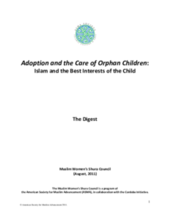Executive Summary
A common conception is that Islamic law forbids adoptions. However, this belief misses the complexity of Islamic law, the scope of adoption laws and practices across the world, and the overwhelming emphasis on taking care of orphans and foundlings found within Islamic sources. Contemporary adoption practices are immensely complex issues, overlapping with children’s rights, international and national laws, human psychology, economic, social, and religious concerns, and the ethics of lineage, identity, property and inheritance rights. In this position paper, the Muslim Women’s Shura Council considers whether adoption can be possible within an Islamic framework.
After examining Islamic texts and history alongside social science research and the international consensus on children’s rights, the Council finds that adoption can be acceptable under Islamic law and its principle objectives, as long as important ethical guidelines are followed. This statement consults the Quran, the example of the Prophet Muhammad (sunna), the objectives and principles of Islamic law (maqasid al-sharia), Islamic Jurisprudence (fiqh), and social science data. The Shura Council finds that, instead of banning adoption, Islamic sources have brought various ethical restrictions to the process, condemning dissimulation and foregrounding compassion, transparency, and justice. These restrictions closely resemble what is known today as the practice of open adoption. Therefore, when all efforts to place orphaned children with their extended family have been exhausted, open, legal, ethical adoptions can be a preferable Islamically-grounded alternative to institutional care and other unstable arrangements.
According to Islamic and universal standards of children’s rights, all children have the right to grow up in a nurturing, loving environment where their physiological, psychological, and intellectual needs are met. All children have the right to know their lineage and to celebrate their unique national, cultural, linguistic, and spiritual identity. All children have the right to a safe, supportive environment where their rights to dignity, education, and the development of their talents are well respected. The best interests of the child should be the primary consideration in all decisions relating to children, including adoption.

